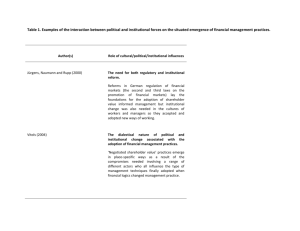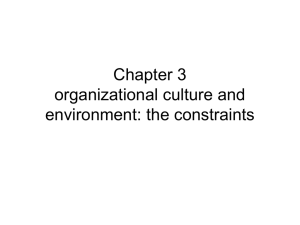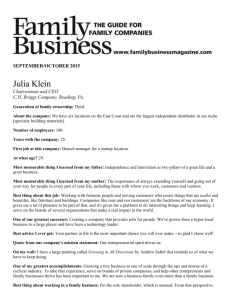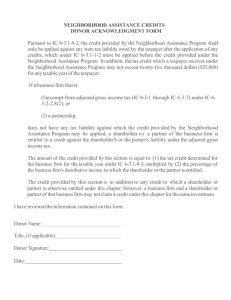SEC Issues New Guidance on Excludability of
advertisement
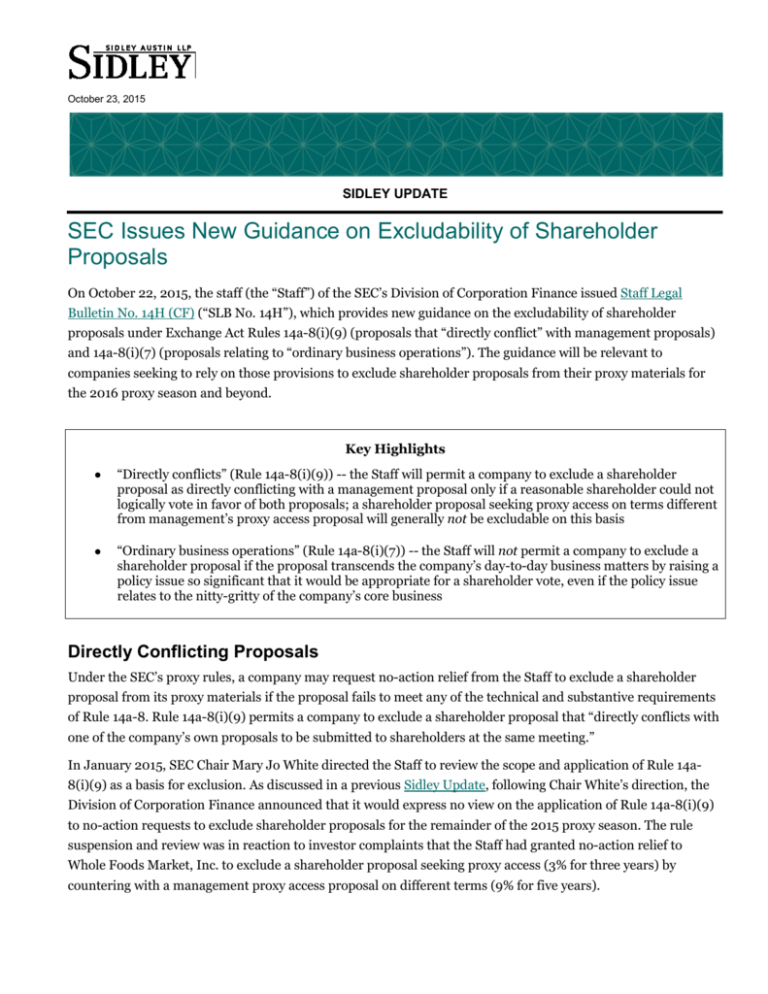
October 23, 2015 SIDLEY UPDATE SEC Issues New Guidance on Excludability of Shareholder Proposals On October 22, 2015, the staff (the “Staff”) of the SEC’s Division of Corporation Finance issued Staff Legal Bulletin No. 14H (CF) (“SLB No. 14H”), which provides new guidance on the excludability of shareholder proposals under Exchange Act Rules 14a-8(i)(9) (proposals that “directly conflict” with management proposals) and 14a-8(i)(7) (proposals relating to “ordinary business operations”). The guidance will be relevant to companies seeking to rely on those provisions to exclude shareholder proposals from their proxy materials for the 2016 proxy season and beyond. Key Highlights • “Directly conflicts” (Rule 14a-8(i)(9)) -- the Staff will permit a company to exclude a shareholder proposal as directly conflicting with a management proposal only if a reasonable shareholder could not logically vote in favor of both proposals; a shareholder proposal seeking proxy access on terms different from management’s proxy access proposal will generally not be excludable on this basis • “Ordinary business operations” (Rule 14a-8(i)(7)) -- the Staff will not permit a company to exclude a shareholder proposal if the proposal transcends the company’s day-to-day business matters by raising a policy issue so significant that it would be appropriate for a shareholder vote, even if the policy issue relates to the nitty-gritty of the company’s core business Directly Conflicting Proposals Under the SEC’s proxy rules, a company may request no-action relief from the Staff to exclude a shareholder proposal from its proxy materials if the proposal fails to meet any of the technical and substantive requirements of Rule 14a-8. Rule 14a-8(i)(9) permits a company to exclude a shareholder proposal that “directly conflicts with one of the company’s own proposals to be submitted to shareholders at the same meeting.” In January 2015, SEC Chair Mary Jo White directed the Staff to review the scope and application of Rule 14a8(i)(9) as a basis for exclusion. As discussed in a previous Sidley Update, following Chair White’s direction, the Division of Corporation Finance announced that it would express no view on the application of Rule 14a-8(i)(9) to no-action requests to exclude shareholder proposals for the remainder of the 2015 proxy season. The rule suspension and review was in reaction to investor complaints that the Staff had granted no-action relief to Whole Foods Market, Inc. to exclude a shareholder proposal seeking proxy access (3% for three years) by countering with a management proxy access proposal on different terms (9% for five years). SIDLEY UPDATE Page 2 After reviewing the history and intended purpose of Rule 14a-8(i)(9), 1 the Staff has announced in SLB No. 14H that it will interpret the rule more narrowly than it has in the past. Specifically, when considering future no-action requests under Rule 14a-8(i)(9), the Staff will consider a “direct conflict” to exist between the management proposal and the shareholder proposal “if a reasonable shareholder could not logically vote in favor of both proposals, i.e., a vote for one proposal is tantamount to a vote against the other proposal.” Proposals seeking a similar objective (e.g., proxy access) but on different terms would not “directly conflict,” as a reasonable shareholder could logically vote in favor of both proposals. In a situation where both the management and shareholder proposals are approved by shareholders, the board may have to consider the effects of both proposals; the Staff does not consider such a decision to represent the kind of “direct conflict” the rule was designed to address. In SLB No. 14H, the Staff provided examples of shareholder proposals that would or would not be viewed as directly conflicting with management proposals. SEC Staff Examples of Proposals That Directly Conflict Management Proposal Shareholder Proposal Proposal seeks shareholder approval of a merger Proposal asks shareholders to vote against the merger Proposal seeks shareholder approval of a bylaw provision requiring the CEO to serve as Chairman Proposal seeks separation of the CEO and Chairman Binding proposal relates to the same subject matter as the shareholder proposal (mutually exclusive mandates) Binding proposal relates to the same subject matter as the management proposal (mutually exclusive mandates) SEC Staff Examples of Proposals That Do Not Directly Conflict Management Proposal Shareholder Proposal Proposal seeks to allow shareholders holding at least 5% of the company’s stock for at least 5 years to nominate up to 10% of the directors and include nominees in the company’s proxy materials Proposal seeks to allow shareholders holding at least 3% of the company’s stock for at least 3 years to nominate up to 20% of the directors and include nominees in the company’s proxy materials Proposal seeks shareholder approval of an incentive plan that gives the compensation committee discretion to set the vesting provisions for equity awards Proposal asks the compensation committee to implement a policy that equity awards would have no less than four-year annual vesting SLB No. 14H notes that the Rule 14a-8(i)(9) exclusion was designed to prevent shareholders from using Rule 14a-8 to circumvent the procedural and disclosure requirements that would apply when soliciting in opposition to a management proposal. In addition, for decades the SEC has articulated minimizing shareholder confusion and reducing the potential for inconsistent mandates as reasons to allow companies to exclude a shareholder proposal that is counter to a management proposal. 1 SIDLEY UPDATE Page 3 In the event binding shareholder and management proposals contain two mutually exclusive mandates and therefore are in direct conflict, the Staff could, in its no-action response, allow a shareholder proponent to revise its proposal to make it non-binding rather than binding, and therefore potentially not excludable under Rule 14a-8(i)(9). On the other hand, SLB No. 14H makes clear that a non-binding shareholder proposal may, despite its precatory nature, directly conflict with a management proposal if a vote in favor of the shareholder proposal is tantamount to a vote against management’s proposal. The Staff provided additional clarifications on the application of Rule 14a-8(i)(9) in response to public comments, including that: • Whether the shareholder proposal was submitted before or after the company formulated its proposal is not a relevant factor; and • A shareholder proposal that merely proposes a “different means of accomplishing an objective,” but does not directly conflict with a management proposal, will not be excludable. Finally, the Staff noted that companies should include complete copies of management proposals in no-action requests to enable the Staff to evaluate whether a company has met its burden of demonstrating that a shareholder proposal is excludable under Rules 14a-9(i)(9) or 14a-9(i)(10) (the “substantially implemented” basis for exclusion). The Staff also noted that, to minimize concerns about shareholder confusion, any company that includes shareholder and management proposals on the same topic in its proxy statement can include proxy statement disclosure explaining the differences between the two proposals and how they would expect to consider the voting results. Ordinary Business Operations Exclusion Under Rule 14a-8(i)(7), a company may exclude a shareholder proposal that relates to “ordinary business operations.” However, a shareholder proposal generally will not be excludable under Rule 14a-8(i)(7) when “a proposal’s underlying subject matter transcends the day-to-day business matters of the company and raises policy issues so significant that it would be appropriate for a shareholder vote.” 2 On July 6, 2015, the U.S. Court of Appeals for the Third Circuit issued its opinion reversing a ruling by the U.S. District Court for the District of Delaware that Wal-Mart Stores, Inc. could not exclude a proposal submitted by Trinity Wall Street on ordinary business grounds. 3 The proposal at issue asked that Wal-Mart’s Compensation, Nominating and Governance Committee provide oversight of the formulation and implementation of policies and standards that determine whether or not Wal-Mart should sell certain products, including certain types of guns. The Staff had granted a no-action request allowing Wal-Mart to exclude the proposal from its 2014 proxy materials on the basis that the proposal related to the company’s ordinary business operations and did not focus on a significant policy issue. Trinity sought injunctive relief in federal district court to require Wal-Mart to include Trinity’s proposal in its proxy materials. Although the district court denied Trinity’s motion for a preliminary injunction, it later ruled in 2 SEC Staff Legal Bulletin No. 14E (CF) (Oct. 27, 2009), available here. Trinity Wall Street v. Wal-Mart Stores, Inc., 792 F. 3d 323 (3d Cir. 2015). Despite Wal-Mart’s announcement on August 16, 2015 that it will stop selling certain types of guns, Trinity filed a petition for a writ of certiorari with the U.S. Supreme Court on September 11, 2015 asking the Court to review the Third Circuit’s decision. Trinity argues that the Third Circuit’s decision is in direct conflict with SEC interpretive guidance regarding the “ordinary business operations” exclusion and severely curtails the important rights of shareholders to bring corporate social responsibility proposals. 3 SIDLEY UPDATE Page 4 Trinity’s favor, finding that the proposal was not excludable as ordinary business because its focus was on having Wal-Mart’s board oversee development and implementation of a significant policy. As a result, Wal-Mart was enjoined from distributing its 2015 proxy materials without Trinity’s proposal. On appeal, Wal-Mart asserted that the district court’s ruling was contrary to the rationale for the “ordinary business operations” exclusion because it would create a significant exception that would be available by couching an ordinary business matter as a matter relating to board oversight. On April 14, 2015, the Third Circuit reversed the district court’s decision, announcing that a written opinion would follow. In its July 6, 2015 opinion, the Third Circuit noted that Trinity’s proposal raises a sufficiently significant policy issue, but not an issue that transcends Wal-Mart’s ordinary business operations. To meet that standard in this case, the Third Circuit stated that the policy issue “must target something more than the choosing of one among tens of thousands of products it sells.” The majority opinion introduced a two-part test as to when the significant policy exception would apply: first, the shareholder proposal must focus on a significant policy issue, and second, the subject matter of the proposal must “transcend” the company’s ordinary business operations, meaning that the policy issue must be “divorced from how a company approaches the nitty-gritty of its core business.” A concurring judge in the case relied on a different approach which the Staff found to be more consistent with the SEC’s historical practice. Specifically, he viewed significance and transcendence as interrelated concepts, and explained that “a proposal is sufficiently significant ‘because’ it transcends day-to-day business matters.” Finally, the Third Circuit recommended that the SEC issue new interpretive guidance to address the increasing number of shareholder proposals that relate simultaneously to an ordinary business matter and a significant social policy issue. In SLB No. 14H, the Staff has stated that it will not follow the “new analytical approach” introduced by the Third Circuit, which it believes could lead to the unwarranted exclusion of shareholder proposals. Rather, it will continue to interpret Rule 14a-8(i)(7) consistent with its and the SEC’s historical practice, and the concurring opinion in the Wal-Mart case: a proposal may transcend a company’s ordinary business even if the significant policy issue relates to the nitty-gritty of its core business. Practical Implications As the Staff acknowledges, the new guidance on Rule 14a-8(i)(9) may present “a higher burden for some companies seeking to exclude a proposal to meet” than in the past, and thereby limit the usefulness of the exclusion for a company seeking to exclude a shareholder proposal that relates to the same subject matter as a management proposal. Particularly with respect to shareholder proposals on proxy access, special meeting rights and shareholder action by written consent, the new guidance makes clear that a company will generally not be able to exclude a shareholder proposal by putting forth a management proposal on the same topic but with different terms. However, the Staff’s new guidance surely has its limits: if a shareholder proposal requests a bylaw amendment permitting 10% of the outstanding shares to call a special meeting, and management puts forth a proposal permitting 90% of the outstanding shares to call a special meeting, it is difficult to see how a reasonable shareholder could logically vote in favor of both proposals. Separately, the Staff’s position that, notwithstanding the Third Circuit’s decision in the Wal-Mart case, it will continue to interpret and apply Rule 14a-8(i)(7) as it has in the past creates a forum-shopping problem. If a company receives a shareholder proposal that would be excludable as ordinary business under the Third SIDLEY UPDATE Page 5 Circuit’s formulation, but not under the Staff’s traditional analysis, the company could choose to bypass the Staff’s no-action process – it is required only to notify the Staff that it intends to exclude a proposal – and pursue an action for declaratory relief in the federal district courts of Pennsylvania, Delaware, New Jersey and the U.S. Virgin Islands. For U.S. public companies incorporated in Delaware certainly, the U.S. District Court for the District of Delaware would have jurisdiction to hear and decide their cases. If you have any questions regarding this Sidley Update, please contact the Sidley lawyer with whom you usually work, or Holly J. Gregory Partner holly.gregory@sidley.com +1 212 839 5853 John P. Kelsh Partner jkelsh@sidley.com +1 312 853 7097 Thomas J. Kim Partner thomas.kim@sidley.com +1 202 736 8615 Rebecca Grapsas Counsel rebecca.grapsas@sidley.com +1 212 839 8541 Claire H. Holland Special Counsel cholland@sidley.com +1 312 853 7099 Sidley Corporate Governance and Executive Compensation Practice Lawyers in Sidley’s Corporate Governance and Executive Compensation practice regularly advise corporate management, boards of directors and board committees on a wide variety of corporate governance matters, including shareholder activism and engagement, fiduciary duties, board oversight responsibilities, board investigations and special committees, SEC disclosure, legal compliance, corporate responsibility, board evaluation, board and committee structures and issues arising under Sarbanes-Oxley and Dodd-Frank. Our advice relates to the procedural aspects as well as the legal consequences of corporate and securities transactions and other corporate actions, including takeover defenses, proxy contests, SEC filings and disclosure issues, stock option issues and general corporate law matters. Our broad client base allows us to provide advice regarding best practices and trends in such matters as directors’ and officers’ responsibilities, board and committee practices, disclosure controls and procedures, internal controls, executive compensation and other matters. To receive Sidley Updates, please subscribe at www.sidley.com/subscribe. BEIJING ∙ BOSTON ∙ BRUSSELS ∙ CENTURY CITY ∙ CHICAGO ∙ DALLAS ∙ GENEVA ∙ HONG KONG ∙ HOUSTON ∙ LONDON LOS ANGELES ∙ NEW YORK ∙ PALO ALTO ∙ SAN FRANCISCO ∙ SHANGHAI ∙ SINGAPORE ∙ SYDNEY ∙ TOKYO ∙ WASHINGTON, D.C. Sidley Austin refers to Sidley Austin LLP and affiliated partnerships as explained at www.sidley.com/disclaimer. www.sidley.com
